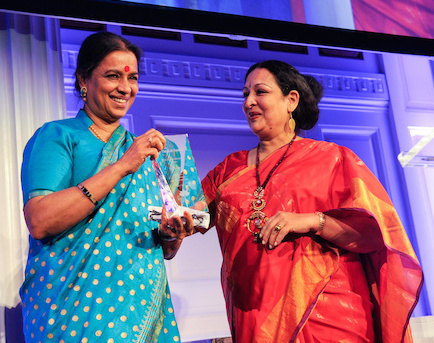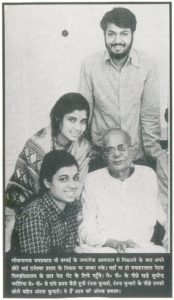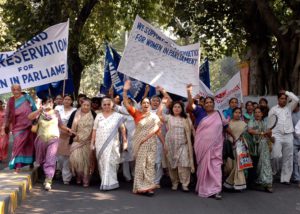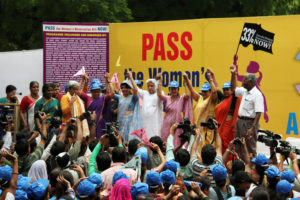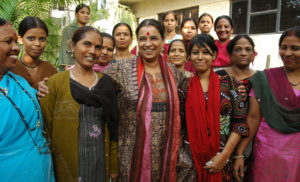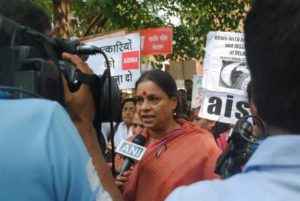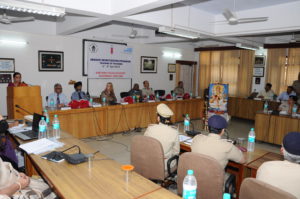Dr. Ranjana Kumari is a renowned academician and social activist, who currently serves as the Director of the Centre for Social Research in Delhi, as well as the Chairperson of Women Power Connect, a national level organization of women’s groups. Lotus Leadership Award winner (2015), Dr. Kumari has dedicated her life to empowering women across South Asia, and has authored many well-known publications.
Congratulations on being honored with the Lotus Leadership Award by the Asia Foundation, New York for your relentless efforts for the empowerment of women and girls across India. You have been a long-time champion of women’s causes. What fueled your interest in women’s issues and how did you carve your path towards social activism?
It’s been many years now, since I was a student in Jawaharlal Nehru University (JNU), and even before that when I was in school, my friends’ lives inspired me to get into this area of activity. I come from a family of freedom fighters where everybody was very actively involved in social causes. Basically, when we were very young, I saw the lives my friends led in the kind of a small city that I came from. Girls were married at a young age. By the time we passed 12th, most of my friends were married. Each one of them had a terrible story to tell me both before and after marriage. They wanted to study, but they weren’t allowed. All kinds of crises happened with them because of the fact that they didn’t get into a proper relationship. Parents decided who to marry and they had to agree. All of this hurt me very deeply. As you know, teenagers love and care for each other a lot. So, seeing my friends was something that actually brought me to the issue of how women have no choices. When I started making my choices, I had my share of troubles as a young woman.
At my time, we had this huge issue about how I wanted to go to Delhi to study. In smaller cities with joint families and traditional backgrounds, girls, as you know, were not sent out to study very often. Coming to Delhi was a big challenge for me, and so was going for higher education in a place where both boys and girls studied together. There were fears like she’ll run away with a boy or she’ll marry outside the caste and things like these. There was also a huge issue about how a girl can stay on her own and why could she not study where she lived within the supervision of the grandparents and parents.
As a person coming from a Gandhian family, I adopted the Gandhian method to rebel against it. I used to fast etc. Finally I was able to pressurize them to send me to Delhi. Later, what my grandmother had predicted came true because I did get married to the man of my own choice. From personal choice to choices women are forced to make, that was something I felt was not the equal life that they get or want.
Also, studying in JNU and being a very active student politician, I confronted the issues of my time including the emergency movement and all of that. As my father died when I was young, I was forced to join Delhi University as a lecturer. I got that job and I managed to join, but at the same time I wanted to do something different than just teaching. So I, along with a group, started this institution to make academics more relevant. And that can only happen when you go to the community and people, and get your knowledge, and in some way work from them. So this is what we did and the Centre for Social Research (CSR) was started. And then, of course, the journey started. Then we started looking at different issues in terms of research, to do more informed advocacy. When you do research, you are kind of responsible for someone following your findings and recommendations. So we started working with communities, development division, research division and finally we also started training police and people from different sectors to become more gender sensitive, and that’s where it really started.
Tell us a little bit more about your childhood. Where were you raised? What was it like to grow up as a girl in India? Did you face any discrimination?
I grew up in the city of Varanasi. My family comes from a village near Varanasi. Since my grandfather was a founder of the Kashi Vidyapeeth, which was a response to the call of Gandhiji’s Swadeshi movement, as a part of which education was to be made Swadeshi. I was raised in the compound of Kashi Vidyapeeth. Also, coming from a very Gandhian family, I saw many things inside the family being allowed to me that weren’t allowed to other girls at that time. There was very staunch Gandhian values in the family, to the extent that we all learnt to wear Khadi when we were young. But also, one thing that was very unique to my childhood experience was the fear in the minds of family and parents was that if the girls are left alone, they will get physically violated. So, like in every Indian family, protecting the chastity of a girl in was very prominent in the mind of my family too, especially my grandmother. I was raised in a joint family where the grandmother rules the family. So I did have some taste of matriarchy. Even in a patriarchal society, it was my grandmother who’d decide how much money each person gets, and things like that. So I did have that one fear of women getting sexually violated. That was also one of the reasons a lot of us got married very young.
The second thing that was very important in the Gandhian families of that time was education. My aunt had a Master’s degree in that time. My mother was sent to school after marriage. Education was a big value, but at the same time, co-education wasn’t okay. We were told that you must go to a girls’ college or a girls’ school. That kind of a gender segregation was very prevalent. We also saw a lot of do’s and don’ts defined for girls and boys. For example, you couldn’t stand at the door and laugh openly. I remember my grandmother telling me, “Dehleez par khade ho kar baal khol kar mat haso”. So many bodily restrictions were there. In Hindi they’d say, “Chaati taan kar mat khadi ho”. Our principal used to tell us, “Thik se dupatta odho”. So we lndian girls, were made conscious of our body, all the time. I later realized that we had no control over our own body. For example, marriage, children, everything is defined and produced to you. That is what I felt.
When it comes to real discrimination, I’d say that it wasn’t there. Perhaps, that was because of the socialist and democratic Gandhian values that I was raised in. So you know, the broader value system was the same as every other conservative family in the society. When it came to going outside the home from my house to BHU, I wasn’t allowed. They said I couldn’t go to BHU and study. But I also argued with my family and said that if I don’t go to BHU, I won’t study. Then my father challenged me. He said, “Okay, I’ll send you to BHU. But then you have lost a year, so give intermediate and pre-university together. So you have to qualify both.” And I did qualify both. One with a distinction and a gold medal, and the other with a first class. I did do very well because I studied hard to prove myself.
But I did face many instances of harassment of all kinds from boys. There were boys pulling the dupatta, pinching, unnecessarily pushing us so we’d fall off our cycle. A group of girls would go to Lanka market, which is adjacent to the BHU road. It is where girls and boys would meet for coffee, and even at that time, flirt a little. This was also the place where boys really harassed university students. They’d gang up, they’d pass really dirty and nasty comments, target girls and all kinds of things. So all types of experiences like these, of being a woman who is always a target of men’s sexual desires and cruelty, was something I experienced even at that age.
What kind of emotions did you experience? Did it make you angry and more rebellious or did it instill a sense of fear in you?
Yes. This is a very good question actually. There were two choices; choice one was what my friends, who always deterred me, would say. They’d tell me, “No, no never go to Lanka. Don’t go this place. No no, we should not because this is not safe.” So this was one group. But as a student I used to play basketball and our basketball coach was a male coach and we had to sometimes go and play with the boys in the BHU field.
So, interactions with boys and men was my natural instinct, but at the same time, I would always feel that if I fear I will have to give up all this, I will never get this opportunity. So in fact, I used to lead them to go to Lanka and I was infamous for doing things that girls should not do in our times. I remember my team-mates. There was this girl who fell in love with the coach (eventually got married to him), and we had to make all kinds of excuses. Also, we used to wear skirts. so what should be the length of the skirts was decided by the principal of the college. We would fold it a little and get scolded. After leaving college, I wrote a skit. We had to say bye-bye to the college, we all wore saris, and we made dupattas of saris, falling dupatta saris, 5 and a half meters long. Long dupattas, covering ourselves like crazy, walking while bending because she would always say, “thoda jhukkar chalo, aise nahi, ye ladkiyo ka tareeka nahi hai.”
So we sent this message to the college, to the principal that this is really like you’re tying the woman with this 5 and a half meters cloth and you’re putting her into this type of a control, Why? Because boys and men will look at you? It is because of men that you have so many restrictions when, in fact, these are the men who are the culprits. I used to get very angry, I must tell you. My student friends and people who know me from college days, will tell you how I used to react; write in college magazines or create a skit or a drama, which we would enact in the basketball field. I had contested for the student union in the University. So I did these things to break that stereotype.
What is your reaction to statements like “India is extremely unsafe for girls? I will not raise my daughter in India.” What is the ground reality? Have we blown women’s safety out of proportion or is it really that unsafe?
Let me tell you, I don’t like it at all. I think it’s a very ignorant statement. Sexual assault happens everywhere. Rapes happen more in France and the USA than in India. They happen in India, but get less reported. So, to say that India is the only such place, I totally won’t accept that. Because if you by the facts and data, all kinds of sexual assault happen. In Europe, USA, Brazil, or any part of the world, so many women are killed by their intimate partners because of being women. Family violence or domestic violence happens everywhere in the world. There’s not one place in the world where women have not faced mental, physical, sexual cruelty. To say that it only happens in India is wrong. Millions of women are going around everyday in India. So many women go from their home to their college, school or to workplace. In villages, girls cycle to schools.
I remember, the first time I started cycling, little innocent boys would run behind us and throw stones at us. They used to find it so amusing that women were on cycles. But I think now that is the whole thing. It is definitely a very big challenge in our country. 35 years of my life have gone into building women’s empowerment. When I’d tell Sumitra Devi or Rekha Dubey or some woman to fight back, go to police and get a complain written, they’d say “No no, you come and scold my husband. We won’t go to the police because after all he’s my husband. Don’t get him arrested or beaten up. He is my man.”
Girls used to walk into my office with parents and brother. In fact, parents and brother used to stay back. They’d tell the girls to not talk about it because it’s a matter of their respect, their families’ prestige. Girls would be expected to suffer and tolerate it. The message that was given to the girls was, “The more you tolerate, the more it’ll change for you. Today this is not the case. Today if a girl is wronged, even the brother comes to my office and tells me his sister has been wronged. I will not let it happen like that.
In these 3 years, I have seen all this happen. This gives me a lot of hope that future will be different. It also gives me the conviction that it is not only in India. In India, we’re certainly responding to it. Take the case of Nirbhaya. How many countries do you see where people freely march on the street and say ‘Rape is unacceptable’? We started the protest in front of the Vasant Vihar police station. We were only about 45-50 women. Then the JNU students joined in. When I reached India Gate, all the media people were pulling me from one studio to another. I remember even Shabana Azmi was there. So was Brinda Karat. All of us were there. I remember that day very clearly. I had never seen so many people gathered at the India Gate for a cause.
So, problems are there. I won’t say that India is treating its women well because it’s not. But at the same time, I can’t say that India is a place where you can’t raise a girl or you can’t have a daughter.
Tell us about the shift you are seeing (if any) in India related to violence against women? Why have things not worked in the past, what needs to be done differently?
I think there are three things that have changed very effectively. I do see my own role in actively promoting these issues with the help of women’s movement in India.
Laws have changed in a good way. We got sexual harassment in workplace, domestic violence law, assault law was changed and laws on giving property rights etc. But only to some extent. There’s still a long way to go in changing laws. For example, there should be a law on matrimonial right to property, as a part of which the woman should get 50% in case of a divorce. It’s not there yet. Women’s right to parental property needs to be worked on. Developments have happened in laws relating to inherited property but nothing’s been done about parental property. It has happened with inherited property, but not yet with parental property. Parental property still goes to the boys and girls don’t get it. So I feel that there’s a long way to go until women get equal right to property as well as power. Equal right to power is a major area of work. I have firm conviction that if women are equally represented in positions of power, especially inside the parliament, that will be a quantum jump from what we have achieved so far. It is then that we will start determining the future of the nation, start making the policies, aggregating the budget and start doing things equally with men. So power at home will come by getting equal right over the property, and power in the parliament as policy maker, that is something I see as a solution.
Do you have any political aspirations?
Well, so many years of my work I think I have been able to do something which gives me a lot of happiness and satisfaction, that you know, women’s empowerment issue should move many many steps from where we started. Lot of women from the younger generation don’t think that they need to do something for women’s rights because they’ve got it. They’ve got it from the very early age but India is a large country. We have a large population which needs more urban educated women. We still have Dalit women, we still have tribal women. We have a long way to go, so I feel that we need to work, for example, for our Dalit women. They still suffer from all forms of inequality, so I feel the younger generation has a huge responsibility. They got it easy, they got their education, they still are able to do things they want to, unlike us. I remember in my own marriage no one could come from my family because I did break the caste barrier, so you know, I think those are the sort of things younger generations really need to take as a challenge, and do it for the future of the country. At the same time I feel that a lot of things we have managed to achieve, at least in women’s issues cannot be ignored anymore. Whether you are in politics, or bureaucracy or anybody anywhere, you have to confront this issue. Even in the family, girls are starting to question. So parents also have to confront it. So the most important is to look at the change that is happening among men and boys. You know, because it won’t happen without men and boys. It has to happen together, so it is the kind of interdependence. All these issues that women are changing and getting empowered will have to be embraced by men and boys. They must also accept that a wife working in an office is equal to them. So her rights at home are as much as my rights, her duties are at home as much as my duties, then only the responsibility of joint parenting, work sharing and property sharing, everything will come as equality. That is the fundamental thing that has to happen, change has to come in men and boys equally as women and girls are changing.
What are the major challenges you face in your line of work? It is hard to quantify the impact of activism or social change. How do you keep yourself optimistic and motivated?
First of all, CSR has a wonderful young team. We have been lucky to get very motivated, very energetic, young minds that are full of ideas. I take a lot of pride in creating hundreds of young men and women today who are serving today in international organizations, in the government, in different agencies. People have been trained at CSR, are now working in the United Nations. So we’ve created a whole gender expertise to deliver. That’s one strength of the organization that I take a lot of pride in.
But we have also had our moments of difficulty because I feel that the gender sector, the NGO sector, is the most deprived sector in terms of resources. So to anybody who’s looking to set up an NGO, I’ll give the advice of looking into the resource issue of it. Because this is one agency where you have to dig your well everyday and drink your water.
Everybody talks about civil society. People are criticizing. Even the Prime Minister set five star NGOs and whatever. This is a very low paid sector. You’ve to raise funds. Your commitments and work expectations are very high. Motivation is, not only because you’re an employee, but because something in your own self is driving you. You’re not just an employee; you’re a person who has committed to the cause. That is why you came in this sector in the first place.
So I feel that you need to sustain in this sector. Because without the role of civil society and organizations like ours, democracy will not flourish. Democracy needs this fourth pillar, and civil society is its strongest fourth pillar. It is a mediator between people and the government. Otherwise, if there were no organizations like ours, or other such organizations, we’d never have had the issues of child rights, women’s rights, farmers’ rights, human rights and environment etc being raised in the country. After all, governments won’t raise these issues. Neither the political parties, nor the corporate sector will raise these issues. So who will be the voices of these people? It is organizations like us.
We’ve had a lot of troubles in terms of resources, but our spirit has kept us going.
CSR works closely with the police force and started the first police sensitization training more than 10 years ago. However the police’s attitude towards gender issues and violence is still slack. Not registering the case, bribing the family, the police are still infested with such problems. What is really the problem here? Are they genuinely not interested in lowering prosecution rates?
Well I think that police is one force which unless ready, strongly motivated and sensitized, we will never be able to get in the situation where we are able to protect citizens of the country, and much more so, women of the country. That’s why we took the challenge of gender sensitization. Now we are implementing a program with the Human Rights Commission, jointly, we are going to all the police training colleges and training the trainers. We have done it in Haryana, Karnataka and UP. We are going to slowly cover Hyderabad. We also do thana level training, police can be sensitized because thana level is the first past-the-post. If thana doesn’t agree with you or don’t see you as person who has been wronged, then you will never get justice. That is what happened for a long time. I do see hope and I’m seeing change, seeing the police become more responsive, if not enough to our satisfaction. But, we’re certainly moving towards that. So, after all police comes from the same society as everyone else. They bring that value and their values get added to the additional powers that they get, they become more difficult to deal with. So, I think police needs change. Police is going through this transformation and making every possible step to sensitize police in the country.
What is your idea of an empowered woman?
A woman who is strong, confident, fearless because if you’re not fearless, you will be wronged. You have to be strong. You have to say no if anything happens, maybe sometimes you have to pay a cost for saying no but don’t accept any injustice ever in life. Say no, be ready to bear the cost but don’t accept any injustice.
Sayfty’s mission is to Educate, Equip and Empower women so that they can protect themselves against violence. What is your message for our readers related to women’s personal safety and the issue of violence against women?
I think that women leaders should certainly look at mentoring more women. Never feel less confident because I see many insecure women politicians. After all you can’t blame them, I think they are brave to have survived the male game played by the rules set by men. Certainly, it is very difficult for them but they must encourage more women because normally they don’t do it, they fear other women. I don’t think they should do that. I think they should build their own constituency. Any women politician who is able to build a constituency for herself with her own women supporters will be formidable force in the country but so far it is not happening. You have one woman here, one there, surviving on mercy of male politicians, it doesn’t really help. So, civil society women should not do that. They should mentor more women because the more advocates you create, the more freedom you will achieve in the society.
My father used to say, “If you want to go fast, go alone, but if you want to go far, go with a team. Take people along”. But these days everyone wants to be fast. So, try to go far, try to achieve a vision. Because you are destined to create your impact on society. And you can do it only when you start working towards it. Make a mission in life and try to achieve it.
Bio
Dr. Ranjana Kumari is a renowned academician and a prominent women’s rights activist. She currently serves as the Director of the Centre for Social Research (CSR) in Delhi, as well as the Chairperson of Women Power Connect (WPC), a national level organization of women’s groups.
Dr. Kumari went to school in Varanasi, Uttar Pradesh, after which she moved to Delhi and did her MA, M.Phil and Ph.D in Political Science from Jawaharlal Nehru University (JNU). Her foray into social work was initiated by her distress regarding a dowry death that took place near her home in 1976. Having witnessed such an abhorrent crime, she took part in a protest with Ms. Pramila Dandavate, the then president of the Mahila Dakshata Samiti. At the time, she was employed as a lecturer in Delhi University. However, her firm belief that education was futile in the face of such discrimination and inequality made her take up the cause of women’s empowerment with a passion. This was the genesis of the Centre for Social Research (CSR), which was established with the aim of working for the disadvantaged and neglected sections of society.
Dr. Kumari also serves as the Coordinator of the ‘South Asia Network against Trafficking in Persons’ (SANAT) and is a member of the Central Advisory Board for the ‘Pre Conception and Pre Natal Diagnostic Tests Act, 2001’ and the ‘Central Advisory Committee for Prevention of Trafficking in Women and Children’. She has recently been appointed as a member of the National Mission for Empowerment of Women by the Prime Minister of India. She is also the General Secretary of the Mahila Dakshata Samiti, Coordinator of Joint Action Front for Women (JAFW), has been senior advisor to the Ministry of Labor, Government of India and also member of the Task Force on Industrial Relations for the International Labour Organization (ILO) in Geneva.
Dr. Kumari has dedicated her life to empowering women across South Asia and has authored many well-known publications. Some of her published books are – Gender, Work, and Power Relations: A case study of Haryana; Women in Politics: Forums and Processes; Reign She Will; Brides Are Not For Burning; Dahej Pidit Mahilayein. She has also published a number of research reports, such as – Higher Education and Scheduled Tribe Youth: A Case Study of Chattisgarh; and Impact of Education on Scheduled Caste Youth in India: A Study of Social Transformation in Bihar and Madhya Pradesh.
Some of the causes closest to her heart include participation of women in democracy and governance, ending of dowry practices and dowry-related violence and the abolition of gender-based sex selection. Having dedicated her life to significant social causes, Dr. Ranjana Kumari continues to impact the lives of many with her dedication and zeal.

